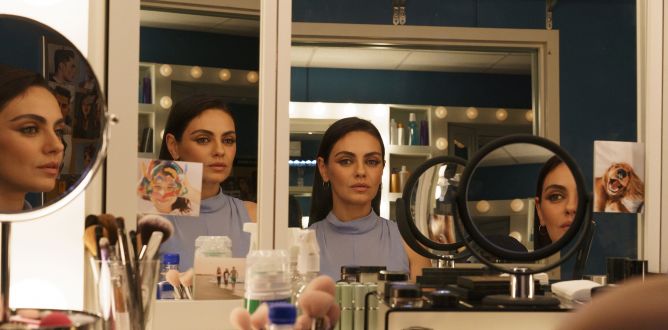Luckiest Girl Alive Parent Guide
A skillful performance from Mila Kunis isn't enough to compensate for the movie's inability to adequately manage the big issues it raises.
Parent Movie Review
Ani Fanelli (Mila Kunis) seems to have it all. Her fiancé (Finn Wittrock) is handsome and rich, she’s a senior editor at a magazine with a shot at a job with The New York Times, and her wedding is shaping up to be the ideal day. But when a documentary director reaches out to her to discuss a school shooting that she lived through, Ani’s carefully hidden past starts to creep into her perfect life, threatening to tear it all down.
Luckiest Girl Alive deals explicitly with rape and gun violence. If either of those topics are triggering or difficult for you, you can stop reading now and know that this is not the movie for you. As you can imagine, this is not a film for children or teens because of the explicit nature of these topics as well as the extreme level of profanity and depictions of teenage drinking. I believe that these are topics worth exploring and stories worth telling, but this particular story is aimed squarely at an adult audience.
Now that that’s out of the way, I don’t feel that this story deals with the aforementioned topics skillfully. The overall message - that survivors of sexual assault deserve to have their stories heard - is immensely important and not one to be taken lightly. The problem is that Ani Fanelli is deeply unlikeable, and she uses her past trauma as a way to elevate herself socially; not to actually make a difference for other people or to enact larger changes. At the very end of the film, she realizes that telling her story is helping other survivors, but it feels like a tacked-on afterthought. The school shooting is not used to glorify the perpetrators, which I appreciate, but they are also given quite generic motivations, which feeds into simplified explanations of these tragic incidents. The topic of gun control skirts along the edges of the story, but the film doesn’t say anything about it either way. The one thing I think the movie does well is to show how rape victims are shamed, blamed, and ignored by institutions and the justice system, especially when rapists are in the upper echelons of society.
Mila Kunis is electric in this role. She plays Ani’s façade and pain with immense skill, and she is believable in every moment. The production itself is high quality, with a great score, high quality cinematography, and a stellar supporting cast. Unfortunately, the story doesn’t live up to that quality. Some of the flashback scenes to the horrific events feel excessive. Ani doesn’t achieve self-actualization by working through her traumas and learning to deal with them in a healthy way, but by using those traumas to get famous. The pieces are there to create a a thought-provoking meditation on rape culture, violence, and trauma, but the script never quite puts them together, which makes the serious subject matter feel shallow and exploitative.
Directed by Mike Barker. Starring Chiara Aurelia, Mila Kunis, Connie Britton. Running time: 115 minutes. Theatrical release October 7, 2022. Updated January 12, 2024Watch the trailer for Luckiest Girl Alive
Luckiest Girl Alive
Rating & Content Info
Why is Luckiest Girl Alive rated R? Luckiest Girl Alive is rated R by the MPAA for violent content, rape, sexual material, language throughout and teen substance use.
Violence: A school shooting is shown in detail, with teens being shot and killed. A character stabs another with a knife. Characters have a fistfight.
Sexual Content: A woman writes for a sex advice column, so there is explicit discussion of sexual activities. A teen girl is raped multiple times. No nudity is shown, but it is explicit.
Profanity: The script contains approximately 50 sexual expletives, 20 terms of deity and 15 mild and moderate expletives.
Alcohol / Drug Use: Teens are seen smoking and drinking, some to excess. Adults are seen drinking and smoking.
Page last updated January 12, 2024
Luckiest Girl Alive Parents' Guide
Why does Ani decide to tell her story? What happens when she does that?
Home Video
Related home video titles:
Women finally speak out against a culture of workplace sexual harassment in Bombshell.
Teenage girls use an undercover zine to call out their school’s sexist culture in Moxie.
In Misbehaviour, a group of women stage protests against the 1970 Miss World competition as a way to draw attention to social misogyny and sexism.
Sex offenders receive violent retribution in Promising Young Woman and Asking for It.

